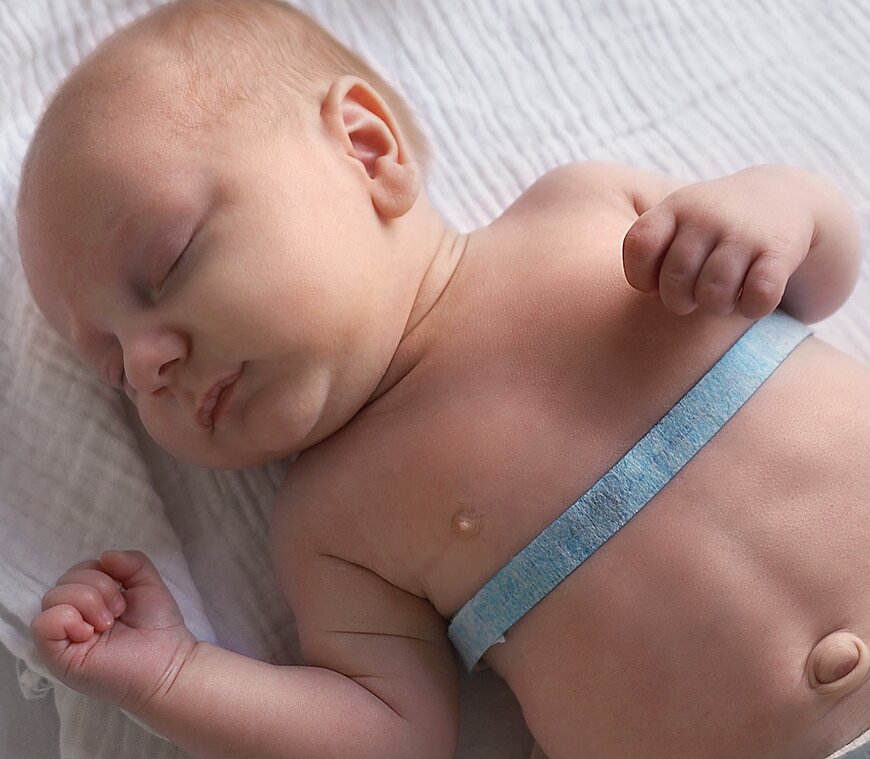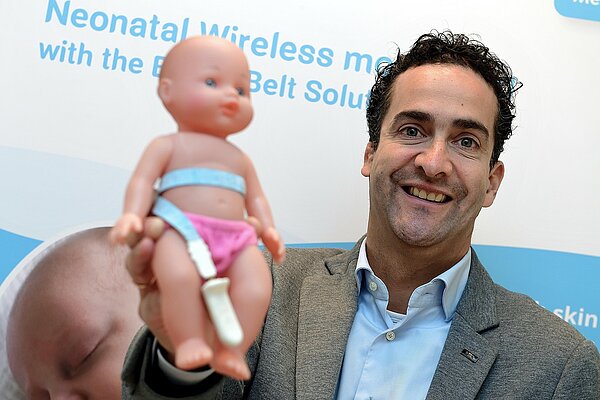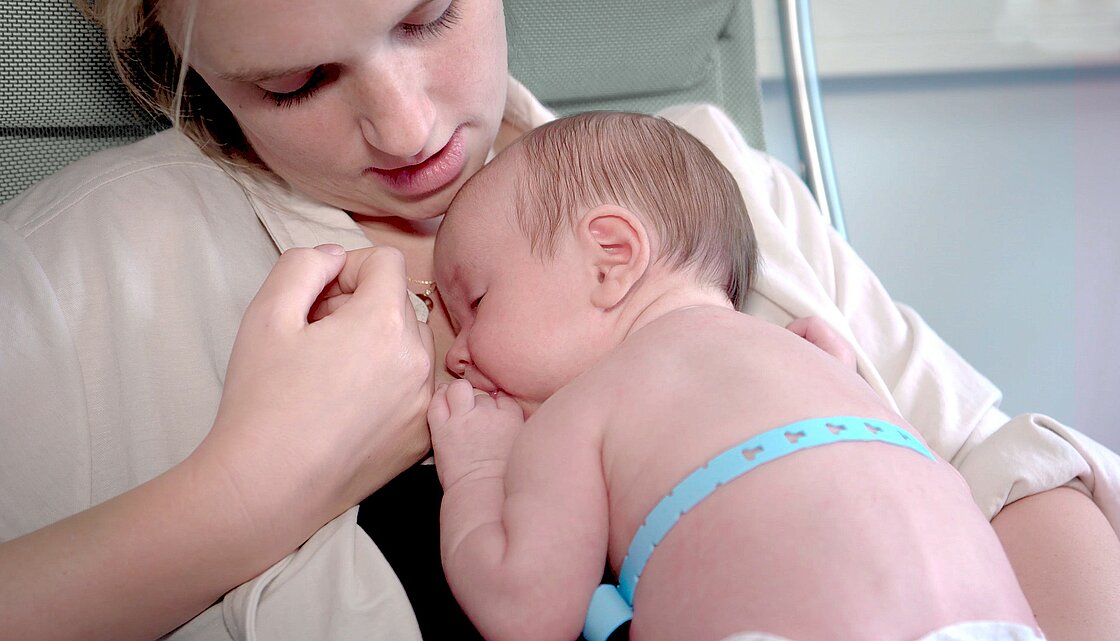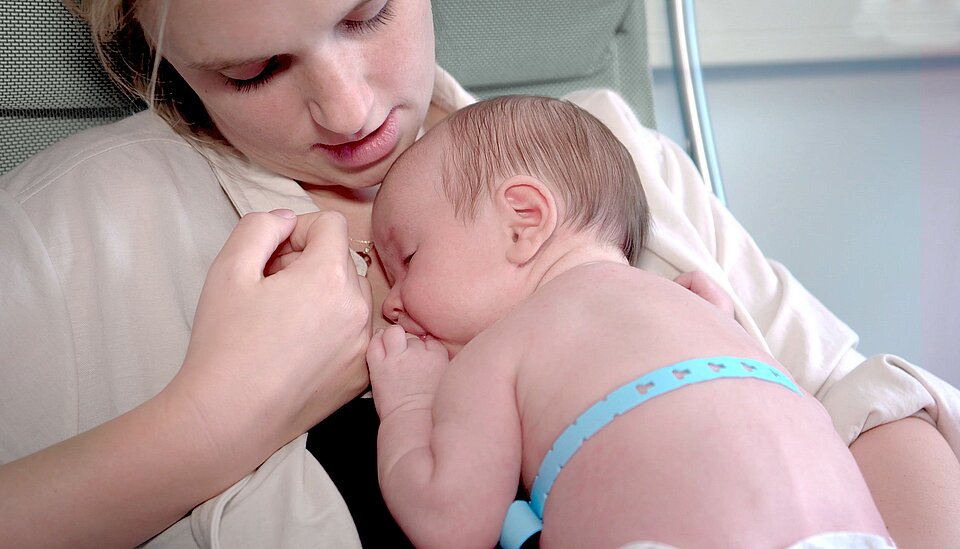Bambi Medical gives premature babies a good start
The Bambi Belt from Bambi Medical can significantly improve the life of a premature baby. For a long time though, there were real doubts about whether the product would ever come to market.

Imagine: you come up with a wonderful invention that can make a huge difference to the lives of premature babies, but every commercial company you approach has cold feet. This is exactly what happened to Sidarto Bambang Oetomo, a highly respected paediatrician-neonatologist. His idea for the Bambi Belt came to him back in 2008. An alternative for the adhesive pads that are stuck onto the vulnerable skin of premature babies to monitor their vital functions.
Pain and stress caused by adhesive electrodes
“Moving or removing the electrodes can damage the skin”, says Sidarto. “Not only is this painful, it also increases the risk of infection. Furthermore, babies can get entangled in and pull on the wires attached to the electrodes. That also causes pain and stress, which interferes with brain development.” The system of adhesive electrodes and wires connected to a box has another major disadvantage: it complicates Kangaroo Mother Care, a method that seeks to maximise skin-to-skin contact between the baby's front and the mother’s chest. Sidarto calls the mother's breast the place to be for a new-born baby: “Skin-to-skin contact promotes growth and development of the baby. There is considerably less stress and breastfeeding is also much easier.” So babies who receive kangaroo care can generally be taken home sooner. Research has even shown that far fewer babies would die if all premature babies were to receive kangaroo care.
Monitoring the vital functions of even the tiniest babies
Sidarto's invention makes kangaroo mother care easier because there are no wires. The Bambi Belt is a small band around the baby's chest. The belt contains sensors that send signals to a portable monitor. The material does not damage the skin. As a result, doctors can monitor electrical activity in the heart muscle of even the tiniest premature babies - the ones that weigh only 500 or 600 grams and whose skin is still far too delicate for adhesive electrodes. Previously, it had only been possible to measure the heartbeat and the amount of oxygen in the blood of these babies (via a kind of plaster around the foot). This is a major advantage of the Bambi Belt.
Cooperation between Máxima Medical Centre and Eindhoven University of Technology
The idea for the wireless monitoring system dates back to 2006 when the Máxima Medical Centre, where Sidarto Bambang Oetomo worked as a paediatrician-neonatologist, and Eindhoven University of Technology decided to engage in joint scientific research. Sidarto was appointed to the position of Professor of Industrial Design. His teaching assignment: paediatric applications of ambient intelligence, a form of artificial intelligence which focuses on surrounding humans with smart devices to make life more pleasant. “Together with my students, I developed several ideas to reduce the stress and discomfort experienced by children in the Neonatal Intensive Care Unit. We also devised ways of strengthening the parent-child bond during the period when the child is in hospital.” Under Sidarto's mentorship, one of the students made a prototype Smart Jacket as a graduation project – the predecessor of the (much smaller) Bambi Belt. This led to the first scientific publication of the findings in 2008.
Cold feet
Almost without exception, the commercial companies that Sidarto approached to discuss further development and marketing of his Smart Jacket reacted enthusiastically to his ideas. But, in spite of all the enthusiasm, none of them wanted to progress to the next stage. A fear of getting their feet wet: that is how the neonatologist describes their tentative response. “This is an extremely advanced product that requires major investment. Established companies often prefer to leave scenarios like that to start-ups.” Funding provided by a pharmaceutical company made it possible to take product development a step further in 2012, but then things came to a halt. Sidarto: “I remained optimistic, but eventually realised that the project was going nowhere. And that was extremely frustrating. I knew that I had a great product, particularly when I talked about it with parents and nurses. They kept asking me: When will the Smart Jacket be available?”
“Just leave it to me.”
For years, Fabio Bambang Oetomo wanted to become a doctor just like his father. However, he seemed to have more talent for econometrics and, after successfully obtaining a masters degree in Actuarial Sciences in Amsterdam, he went on to work in various financial positions for companies like Deloitte and Mars. Even though he very much enjoyed his job as Factory Controller at Mars in Veghel, he realised that there was only one way to ensure that his father’s ground-breaking invention would actually be used in hospitals: he decided to quit his job and devote himself fully to completing development of the Smart Jacket and bringing it to the market. Fabio: “I had advised my father on how to commercialise his plans for a number of years and was astounded by the reactions; one rejection after the other. There was one company who wanted to work with us, but only under scandalous terms and conditions. So I thought: Why don’t I do it.”

Fabio realised that there was only one way to ensure that his father's ground-breaking invention would actually be used in hospitals.
Bambi Medical
Sidarto had mixed feelings about his son's plans. “I was over the moon because we now had a real chance of making a success of my invention. But I was also concerned. Fabio has a family and young children, so was giving up his job and starting his own company a wise choice on his part?” Fabio's wife and mother-in-law were also concerned about the loss of a steady monthly salary. However, they rallied round and supported his decision when Mars' senior management assured Fabio that there would always be a position for him with the chocolate giant. On 1 March 2016, he took leave of his colleagues and started Bambi Medical.
HighTechXL accelerator programme
Because working from home turned out to be difficult, Fabio soon started to look for office facilities. Which he found at the High Tech Campus in Eindhoven. “We were welcomed here with open arms and also immediately encouraged to participate in the accelerator programme run by HighTechXL.” That turned out to be a golden tip. HighTechXL helps start-ups and innovative teams in large companies to grow into successful businesses. There is just one catch: you must have a great idea, which will have a major (social) impact. After making a successful pitch, Bambi Medical entered the pressure-cooker environment of the accelerator programme. The programme addresses all the facets of entrepreneurship on a fast-track schedule. According to Fabio, they learned a lot from it: “We were constantly sent out into the field to check our assumptions in meetings with end-users.” Sidarto is convinced that the accelerator programme played a crucial role in Bambi Medical's success: “Obviously, we are experts in our own professional fields, but we didn't know much about building a successful business. Thanks to HighTechXL, we made a quantum leap in just months.”
Working without pay
Even though the idea was selected for the accelerator programme, HighTechXL was critical of one point: there was still no team. Because Sidarto was working full-time at the Máxima Medical Centre at the time, Fabio was the only person who could pour all his energy into Bambi Medical. “I started looking for other team members. But, unlike the situation at Mars where I could offer new employees attractive contracts, I now had to tell people that we would not be able to pay them a salary for the time being.” Fortunately, being paid a salary appeared to be of secondary importance to his new colleagues. They were prepared to work for Bambi Medical because they wanted to contribute to a better world. Fabio: “The fact that people were willing to work here without pay proved to me once again that we produce something totally unique. Thankfully, we were soon able to pay everybody a salary.” Sidarto adds: “One in two extremely preterm infants have to cope with related disorders in later life. If you can make something that reduces the likelihood of those disorders, you have made an impact on somebody’s entire life. This is an important driver for all our employees at Bambi Medical.”


Opposites
Yet more proof that Bambi Medical 'makes a beautiful product': the company managed to obtain substantial grants to help fund further development of the Bambi Belt. This was largely thanks to the effort and talents of father and son Bambang Oetomo: two total opposites that complement each other perfectly. Sidarto is somebody who is used to and likes working in an environment where he knows exactly what will happen, so he worries more about possible pitfalls. Fabio, on the other hand, is a born optimist who - as he says himself - “loves everything about a start-up: change and innovation, risks and uncertainty”. Sidarto: “Fabio gets my support by highlighting the sunny side of things and I managed to slow him down every now and then; that combination works really well.” The two rarely disagree. “I believe that the strength of our family business lies in our differences - not only in terms of our characters, but also in terms of our backgrounds and experience”, says Fabio. “When it comes to clinical issues, I rely completely on my father’s judgement. And he relies on me in areas where I have more expertise.”
A working Bambi Belt prototype
The team of nine people at Bambi Medical is now working on the Bambi Belt and other products that reduce pain and stress in new-born babies and encourage a stronger bond between the parent and child. Sidarto, who left his job as a paediatrician when he reached retirement age, is now also a permanent member of the team. He was recently knighted - becoming a ‘Ridder in de Orde van de Nederlandse Leeuw’ - in honour of his many achievements, including his contribution to reducing the mortality rate among incubator babies. When setbacks occur during product development, Sidarto occasionally wonders why they ever embarked on this venture. But Fabio always steps in with his unlimited confidence in technology and in the team: “We can find a solution to every problem, however challenging!” However, things sometimes move too slowly for Fabio: “There is so much involved in medical product development; I severely underestimated how much time that takes.” The team has now developed a working prototype of the Bambi Belt in collaboration with the Holst Centre. This prototype is currently undergoing extensive testing in hospitals. Bambi Medical hopes to sell its first products during the second half of 2019. A long-awaited godsend for the future parents of premature babies.